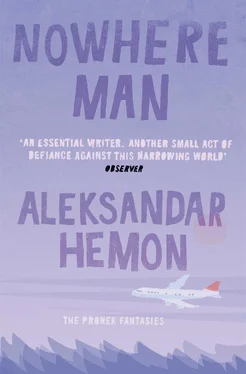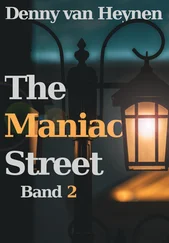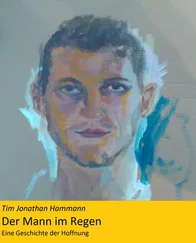“The Nazis,” the fourth man said, “killed all people like that.”
He had a square, large head, and his face was familiar, with the grimaces of someone from former Yugoslavia: generous facial movements and oscillating eyebrows. He shaped and then sliced obscure objects in front of him with his hands, as if angry at the molecules of air.
“They cooked them and tooked their bones and put them in museum,” he said. “They wanted German people to watch monsters.”
“Ugh, gross,” Robin said, and shook her head, with her tongue out.
“Yes,” the teacher said pensively, with her index finger touching her chin. Her wrist was dainty, with two slightly asymmetrical knobs. I imagined stroking that wrist, then her forearm, then her shoulder, and, finally, her neck. She continued: “They would show the skeletons of midgets and Siamese twins in public exhibitions, in order to convince the German people they were superior.”
The fourth man was watching the storm, jerking his left knee.
“There had been one scientist who had gathered human heads, and he had wrote one book for Himmler and his soldiers must have read it to think Jews had been monsters,” Mihalka said.
“I think you use Past Perfect too many times,” the woman with the son scoffed.
“Excuse me,” Mihalka said. “But I must know Past Perfect.”
The fourth man smiled wistfully at Mihalka, and I suddenly recognized the smile: the raising of the left side of the upper lip: the exposing of teeth, which had evenly wide, spitting-conducive gaps between them, the toy-dog nodding; the narrowing of the eyes. I knew that man, but had no memory of him. I stared at him intently, waiting for more familiar signals.
“Okay,” the teacher said. “Let’s read on. Paul, why don’t you read the paragraph beginning with: It is true — they often have. .”
“It is true,” Mihalka began, “they often have — the same — dreams. They also feel the same pain, which is not surprising— surprising —since they share a few internal— internal —organs. The pain, they like to say, is usually— evenly —disturbuted— distributed , or sometimes even— doubled. ”
The fourth man propped his chin on his left hand. His Adam’s apple flexed a little, like a Ping-Pong ball. He stroked his chin with the back of his hand, occasionally looking out the window. His ears were small, like a child’s.
“Thank you, Paul,” the teacher said. “Do we understand this?”
“Doubled means two times. Yes?” the son said.
“Yes,” his mother said.
“Okay. Joseph, why don’t you go on?” the teacher said.
The fourth man began reading in a very low voice, as if confessing:
“Ronnie and Donnie give a new meaning to the word insep— inseparable. ‘ A lot of people think that the worst thing is the lack of — privacy,’ Ronnie says, ‘but they don’t understand what is it like — what it is like — to share not only your life, but your body as well, with someone that you love. Donnie is me, and I am Donnie.’”
A boy kneeling on the soft ground over a constellation of marbles, brushing away pebbles and twigs and litter between the two marbles a foot apart: one of those two marbles was small with three orange fins inside the glass globe; the other one was solid marble white. He picked up the orange marble, got his knees off the ground, and squatted. He wrapped his index finger around the marble, put his thumbnail behind it. The fist contracted, ready to launch the marble. He aimed at the white marble, closing his left eye, squinting with his right one, then released it. His marble flew low over the dirt, and then hit the white one — ping! — and the boy smiled. The white marble was mine and I lost it, and the boy was Jozef Pronek, the man reading about Ronnie and Donnie. I remembered him, there he was, out of nowhere. I was bedazzled by the clarity of the memory.
“‘What people often don’t realize,’ Ronnie says, ‘is that if one of us dies, the other one is going to die too,’” Pronek read.
He had lived in the building across the street from mine, which had displaced a set of decrepit houses with overgrown gardens. My friends and I used to roam the gardens, as if they were unexplored continents. We would eat cabbage as if it were exotic fruit; we would burn cabbage snails in sacrificial pyres; we would protect our territory from intruders, other kids. We found a stray, scabby dog and imagined it to be our guard dog and we patrolled the gardens. So when they built a fence around the gardens and started digging them up, the world went askew. They built an ugly high-rise, which we hated along with its tenants. So we would throw stones into the windows of the building and set their garbage on fire. We would corner a kid from the building and beat him up viciously. Pronek lived in the building and when we cornered him, he would never put up a fight — his nose would bleed, and he would look at us with scorching fury, and then he would just walk away. Eventually, the war against the building withered away, and we ended up playing with those kids. They were not our enemies any longer, but they were not our friends either. They were still newcomers, some of them spoke with strange non-Sarajevan accents, and we were the natives. We let them settle, but they were still in our land, and we never failed to let them know that.
And there he was, reading in heavily accented English, not looking up.
“When they were children, they were known for being good at climbing trees, where they would — hid — hide from other kids and watch them play. ‘It was strange,’ Will Senson, a childhood friend, says. ‘You would look up and there would be four eyes— star —staring at you from above.’”
“Thank you, Joseph!” the teacher said.
Pronek looked up straight at me. I didn’t know if he could recognize me — I had changed a lot, having gone through a long and debilitating illness — but he was staring at me. I looked away, my heart thundering inside. How did he get here? Was he in Sarajevo under siege? Or was he besieging it? I hadn’t talked to him in years, if ever. He leaned back in his chair, but my gaze was avoiding his. What should I say to him? What was his story? What was his life like?
“This is morbid,” Robin whispered to Marcus.
“Saturnine indeed,” Marcus said, and got up to leave, so I obediently stood up. As I was leaving the classroom, I glanced one more time at Pronek and he looked straight back at me, perhaps — and perhaps not — recognizing me. He still seemed angry.
We went back to the office. I said: “I would really like to work here.”
“We could use you here,” Robin said.
“We will call you by the end of the week,” Marcus said.
Outside, dark umbrellas were weighing down on people. The wind side of tree trunks was soaked; the lee-side branches shivered in anticipation of cold rain, wagging their twiggy ends at me as if saying, no, no, I wouldn’t do that. But I did, I walked through the rain — it was cold. I passed a dingy building: A cat was perched in the window of an apartment, watching me somberly, in complete control.
And I remembered cornering a mouse — this had happened a long time ago — in the hall of my building, after it had made the mistake of leaving its tunnels. I tried to grab it by its tail, as it trembled in fearful rage. With the tips of my fingers I managed to grasp its tail — a rubbery tentacle — and lift it off the ground. I remembered Pronek being there, watching me, hating me for what I was doing. The mouse twitched in my hand, desperate, and I giggled, enjoying my power — there must have been some girls around too — until the mouse somehow swung itself upward and bit my palm, two little needles piercing my skin. Pronek was watching me with a smirk, as if he knew all along what would happen. I screamed and let the mouse go, and it scurried away, happy to be alive. I was gripping my right hand, trying to prevent the pain from spreading.
Читать дальше












